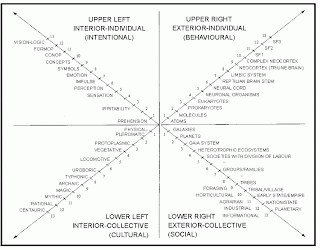Emmanuel Levinas wrote a famous essay, I love the Torah more than God, after reading a short story written by my grandfather, Yosl Rakover Talks to God by Zvi Kolitz. (Note to self: write a blog entry on Yosl and his story.) The essence of this story, if I remember correctly (it has been a while since I have read it) was that Levinas admitted that he could not comprehend God and his actions (or lack of action) because he could not understand how God as we understand the notion could allow something like the Holocaust to happen.
This is kind of a lead in to what I wanted to write about today - can we admire the work of someone (writer, thinker, author, philosopher, guru, ...) for whom we have no admiration as a person? When you read the writings of spiritual 'leaders' like Osho or Gurdjieff (to name but two) and see wisdom, profundity, inspiring words and ideas, thinking that you recognize as 'right' for you... it is very difficult, for me, to reconcile their spiritual wisdom with their life stupidity. When you read accounts of how they treated people, how they abused their power, their (often) material crassness, etc. then what is one to think of their words? Do you throw out the bath water because the baby is dirty? Or do you do as Levinas has done with God, admitting that he cannot understand the creator while confessing his admiration for the creation?
One person who has taken a good stab at framing this question of 'how is it possible to be so developed and enlightened on one level and a total idiot on other levels?' is Ken Wilber. He has developed a philosophical / developmental framework he originally named after himself but later renamed AQAL (all quadrants all levels). The idea being, in a nutshell, that there are four axes of development we all follow and you can be advanced on one axe and not very far along another - concurrently! Thus it is quite logical that someone can be both spiritually wise and a social idiot, or something to that effect.
The framework looks something like the diagram above which I believe he has revised a bit since, but hopefully the idea is clear: four axes - social, cultural, behavioral and intentional - on which we can develop. In some areas we advance faster and in others slower.
I should mention my take on Wilber. I think he is brilliant but I don't think he is enlightened and I think he would rather be enlightened than brilliant. He is a master synthesist (he now, rightfully, calls his work 'Integral') and he is probably one of the more thoughtful and knowledgeable writers-thinkers-philosophers-psychologists of our times. However, I feel that if he would just stop trying to impress everyone with his spirituality (as he has always impressed everyone with his intellect - apparently that was not enough), his writing would be even more fantastic than it already is. He is also a major contributor to EnlightenNext magazine in which he is the Pandit to Andrew Cohen's Guru (Cohen who suffers from the opposite of Wilber - he is probably enlightened but would like to be brilliant - which makes their partnership even more interesting...).
So what do you think, what takes precedence the creator or the creation? Can one shine without the other? Or do only those that walk the talk, like Thich Nhat Hahn, merit our consideration?

No comments:
Post a Comment